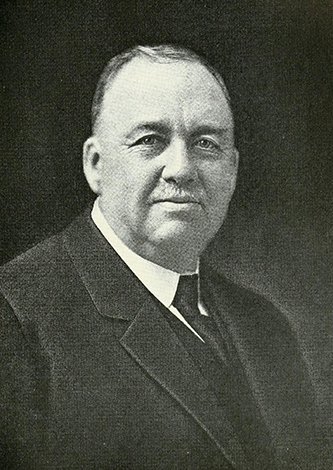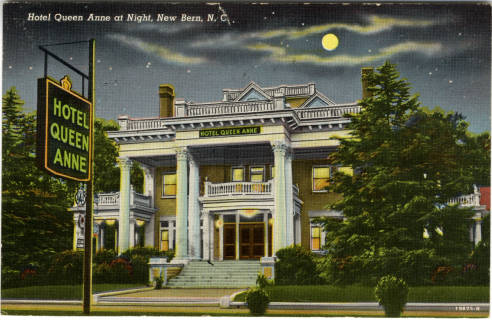14 Mar. 1856–23 Aug. 1918

James Bishop Blades, lumberman, industrialist, and financier, of English ancestry, was born at Bishopville, Md., the second son of Captain Peter Clowes Blades and Nancy Emeline West and a grandson of Greensbury Blades and William C. West, both of whom were successful farmers.
At the age of thirteen, left orphaned, he was sent to the home of an uncle, Ezekiel Williams Blades, in Barry, Pike County, Ill. After a few months he went back to his native town and began clerking in the country store of another uncle, James W. Evans. He attended public schools at Bishopville and Snow Hill, Md., and was graduated from Eastman Business College, Poughkeepsie, N.Y. For a year he taught school at Bishopville.
For several months in 1875 he and his older brother, William Benjamin, operated a mercantile establishment at Greenback, Va. Returning to Bishopville, they formed a merchandising partnership with their uncle under the name Evans & Blades. In 1877 they bought water-powered grist- and sawmills there.
This first milling venture was supplemented by purchases of timber tracts. After his attention was attracted to the virgin forests of the south, J. B. Blades in 1879 traveled on foot, muleback, and railroads through Florida and other southern states. Prospects appeared so bright that he and his brother decided to transfer their operations southward. Florida was considered too far from northern markets, so in 1883 they leased a mill site and bought timberlands near Bath. The elder brother had charge of the sawmills and timber acquisitions, and the younger looked after the sales of the products. Realizing the importance of having a manufacturing plant near their mills, they selected Elizabeth City as their headquarters and moved there from Maryland in about 1888. Joining them were two younger brothers, Dr. L. S. and Carl. G.
Previously, in 1886, the brothers had extended their transactions to Craven County, where timber and labor were plentiful and water transportation was convenient. In that year they leased a mill site on Trent River opposite the town of New Bern, and later they acquired much other real estate eastward. For them was established a post office, discontinued in 1935, which was named "Cherry Point," from the cherry trees growing on the "Point" on the south side of Neuse River east of Hancock Creek, now a part of the U.S. Marine Corps air station.
After traveling alone around the world in 1903, Blades decided to make his home at New Bern. There he and his oldest brother looked after their diversified local interests, while his son, Levin Carl, assumed management of the planning and sales divisions at Elizabeth City.
Surviving the 1893 panic, their business proved highly profitable. For twenty-four years in East Carolina they did much to start and develop modern methods of cutting trees and selling the output of their mills. Dry kilns were introduced, and marketing was expanded. Instead of selling logs outside the state, as other mill men were doing, they confined their operations entirely within North Carolina and thus substantially aided its economy. Most of their holdings, except the Elizabeth City branches, were sold in 1906 to the John L. Roper Lumber Company, owned and operated by the Norfolk and Southern Railroad Company. Although Blades objected, he finally consented to the sale when his brothers insisted that they wanted to retire from business.

At New Bern, Blades built on Broad Street a fine, new home with elaborate, carved mahogany interior woodwork. After being converted in 1939 to the Queen Anne Hotel and later razed, it became the site of the primary local branch of the First-Citizens Bank and Trust Company.
Blades assisted in organizing the Dixie Fire Insurance Company in 1906, then the largest firm of the kind in the South, and became its president. He was also president of the Dixie Insurance Company and vice-president of the North State Insurance Company and the North State Fire Insurance Company. To have closer contact with these corporations, he spent much time at Greensboro, and in 1910 he was instrumental in consolidating the companies. He was also vice-president of the First National Bank at Elizabeth City, and in 1906 he organized the New Bern Banking and Trust Company and became its president. He was president of the Blades Lumber Company and the J. B. Blades Lumber Company. Active in the New Bern Chamber of Commerce, he was the 1913 chairman of its railroad and water transportation committee. He was affiliated with, among other organizations, the Benevolent and Protective Order of Elks. A liberal donor to Methodist and other religious causes, he served as chairman of the board of trustees of the Greensboro College for Women.
During the summer of 1918, Blades went to Western Carolina for a vacation visit. While he was en route alone from Black Mountain toward Statesville, his car failed to make a curve near Marion, and he was killed in the accident. The funeral was at the Centenary Methodist Church, of which he had long been a devout member. The body was taken for interment to the Odd Fellows cemetery at Bishopville, Md., where his parents were buried.
On 4 Feb. 1880, in Maryland, he had married Margaret Ann Warren of Whaleyville, Md., daughter of Joseph E. Warren and Milbourn Dale. To them were born five children, two of whom survived him: L. C. and James Vernon. After his wife's death, he was married on 4 Jan. 1904, at Clayton, to Pearl Tessie Robertson, daughter of Dr. James Battle Robertson and Julia Ann Ellington of Clayton. She also survived him.